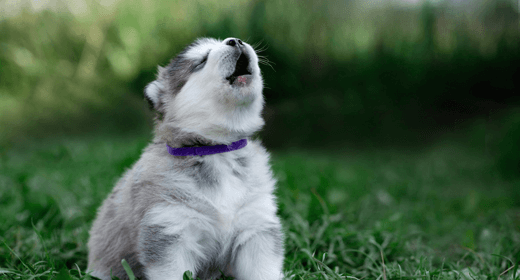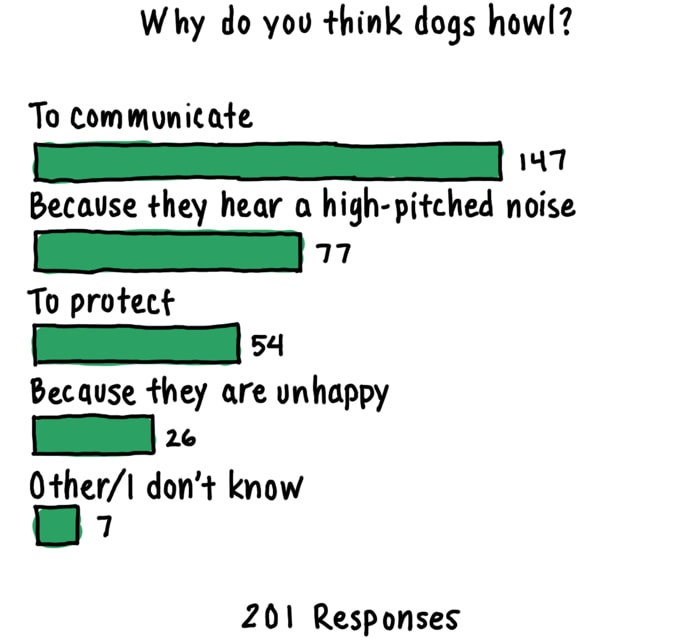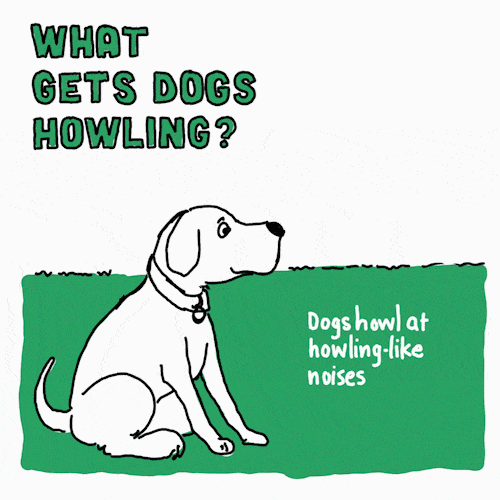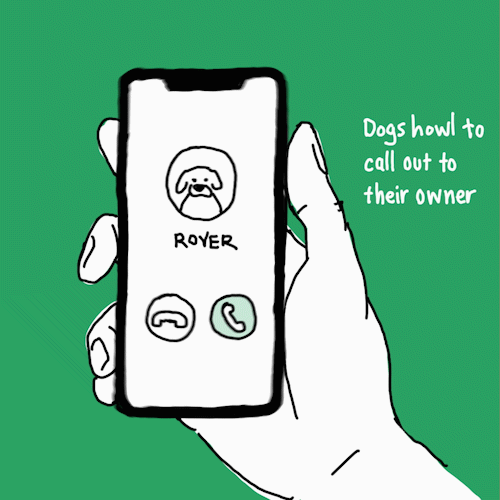

Every pet parent wants to know the meaning of dog howling. Now, we all know what howling sounds like - it’s a high-pitched sound that sounds like a doleful cry. However, many of us are still quite unaware of why do dogs howl. Well, here’s a fun fact: howling for dogs is genetic inheritance. It’s no news that dogs are closely related to wolves. Despite the difference in their sizes, wolves and dogs share around 99% DNA. However, heredity is not the only reason why dogs howl. So, what does it mean when a dog howls, and how can you handle your howling dog? You will find answers to such questions in this article.
To handle a howling dog, you first need to understand the reason why your pet is making this long, wailing noise. Here’s a look at some probable causes of dog howling.
Dogs feel stimulated by high-pitched sounds. Howling is their way of responding to fireworks, sirens, bells, and other noises. This type of howling starts as soon as they hear the shrill sound. As a pet owner, you don’t have to worry about this type of howling since it usually stops when the trigger sound does.
If a dog is excessively attached to you, they might experience separation anxiety. So, once your little companion learns that you won’t be around for a few days, they might start howling under stress and anxiety. If your dog howls every time you need to leave for a long period, it is a sign of hyper-attachment. You might have to treat their anxiety to manage this type of howling. And no, scolding them is not the right way of doing it.
A howling dog could also be seeking attention. And this type of dog howling can be bothersome. You might feel like scolding, questioning, or holding your furball, but you must do the exact opposite of it. Avoid giving your pet any type of attention. Don’t pamper or scold them.
Dogs can sense bad weather, earthquakes, diseases, and so much more. Hence, you cannot rule out the fact that a howling dog could also be trying to alert you of something. Maybe they feel a situation is not right for you or could cause you potential harm. Dogs can sense the intentions of a person through their facial expressions. That’s exactly why dogs howl at some people who try to get near you or your house.
Dogs are still very social animals; it’s just that now we are their pack. When they miss us, they will howl in hopes we respond. Dr. James Serpell, BSc, Ph.D., Professor of Humane Ethics & Animal Welfare at the University of Pennsylvania School of Veterinary Medicine, explains it this way: That [howling] is an attempt on the part of the dog to ask the owner, ‘Where are you so that I can rejoin you?’
Dr. James Serpell doesn’t believe so. “My own research has shown that it is common across breeds. People think huskies may be more prone to group howling.”
Dogs going through separation anxiety may howl excessively when left home alone. Dr. Jo Gale, BVetMed CertLAS MRCVS, Senior Manager for Global Science Advocacy at Waltham Petcare Science Institute, says, “If you reinforce quiet behavior, they are less likely to continue howling.” You can do this by quieting your dog and then leaving for a very brief time before returning and rewarding them when they stay quiet. Gradually increase the time you’re gone to reassure them you’ll always be back.
But what if your pawsome pet is howling due to other reasons? Let’s understand how to handle such situations:
As a pet parent, you must avoid reacting to the howling. This could encourage your dog to howl even more. If you avoid reacting, your dog will understand that howling won’t get their demands met. This might possibly work towards reducing this behaviour in the future.
Pamper your little companion when they do not howl on hearing a siren or bell. Give them attention and love when they are calm to encourage quiet behaviour. Always keep your pet’s favourite treats ready so you can let them know they have been a good boy or good girl by not howling.
If your pooch often reacts to high-pitched sounds, you can even get in touch with a dog trainer. They can work with your dog to change their response to triggering sounds like sirens and fireworks.
Note: Training your fur baby is a time-consuming process. Hence, stay consistent with the actions recommended above and your pet will learn to control their howling triggers.
If you're looking for the perfect dog for you, try our Dog Breed Selector today and enjoy a lifetime of tail-wagging joy.
To understand what a howling dog means to communicate, you need to first read the situation. When dogs howl, it could mean anything–a response to high-pitched sounds, an attempt to attract attention, a suspicion towards someone, etc.
Yes. Since dogs are genetically programmed to howl, it is okay to leave them alone when they do that. However, if it bothers your neighbours, you might want to learn to handle your fur baby or get professional help.
While howling sounds like a long cry, it doesn’t always mean that they are sad.
To stop your dog’s howling, you can reward their calm and quiet behaviour. If they are howling for attention, avoid reacting to it. If you need more help, you may want to reach out to a dog trainer.





When visiting the store, dog owners can get overwhelmed by the array of dog food options available, from dry kibble to canned wet food and more. These processed foods may not be appealing to humans, but they contain all the nutrients that dogs need to stay healthy. Like humans, dogs also need a variety of nutrients from their food, not just from meat as their main diet, but also from grains, vegetables, and fruits. This kind of balance is usually weighed by pet food labels in kibbles or wet food in grams for different types of dogs.
For optimum health, dogs need food that is tailored and customized to their life stages, starting from when they are puppies and all the way into adulthood. Puppies have completely different nutrient needs compared to adult dogs as they are still in their early stages of life. They need enough nutrients to fuel a speedy growth, especially after transitioning away from their mother's milk. Puppies require complete and balanced nutrition with protein to help build their tissues, fats or healthy skin, hair, brain, and vision, carbohydrates for energy, vitamins, minerals, and water.
The need for balanced nutrients in puppies starts with the mother during pregnancy, followed by lactation and growth. Sufficient nourishment for the mother is pivotal in enhancing the puppies’ growth inside the womb and preparing them for life after birth. Both mother and puppy should receive well-proportioned antioxidants, DHA, and prebiotics to support their health and growth as provided by the IAMS product line, which contains DHA that is essential for puppies' brain development while also supporting the mother's pregnancy and quality of milk produced.
While puppies need the primary nutrients for growth, adult dog food has a different level of complexity. Adult dog food requires the same make-up of nutrients as puppies do but tailored to their specific needs. Recent research indicates that an adult dog requires at least 10% of its daily calories from protein and at least 5.5% from fat. Adult dogs need quality protein for firm muscles and a healthy immune system. Additionally, an adult diet can contain up to 50% carbohydrates, with fiber ranging from 2.5 to 4.5%. There is no specific prescribed amount of fibre for adult dog consumption daily, however, it is still one of the most important components in dog food to address constipation and support a healthy weight.
Adult dogs in their prime also require a balance in antioxidants to reduce systemic inflammation and restore active muscles. They should receive Vitamin E and C to support their immune system, joint health, and prevent inflammation. As they grow older, they may be exposed to different diseases from diabetes to cancers, which can be prevented by polyphenols. Parents to adult dogs must acknowledge the most suitable food for their loved one that is comprised of the right amount of nutrients and can look to the IAMS line as they are formulated to support healthy bones and joint health, scientifically proven for healthy digestion with a good fibre and prebiotic blend, as well as antioxidants for a strong immune system.
Besides life stage, balanced nutrition should be adjusted to their breed, which give insight to different factors like weight, mouth size, and energy level. This will then determine the type of kibble and food given. Smaller breeds tend to be more active, requiring the same essential nutrients and prebiotics for a healthy body as well as smaller-sized kibble designed specifically for their smaller mouths. As smaller dogs relatively have a high metabolism, higher levels of protein, fat, and essential fatty acids like omega 3 and omega 6 are some of the important nutrients that should be available in their food. On the other hand, larger breeds require foods that are lower in fat and calories, contain slightly lower levels of calcium and phosphorus, and have a specific balance of calcium-to-phosphorus ratio to support stronger bones and muscles. Owners can look to products like the small breed line from IAMS, containing 7 essential nutrients to build strong muscles, support their tiny immune system while protecting their healthy skin and coat, and the product line for adults for large breeds.
Dog parents must acknowledge and understand the unique needs, life stage and characteristics in their dog to choose the right dog food so their furry ones can grow into their healthiest selves. Make sure to visit your vet regularly to check these components as well!